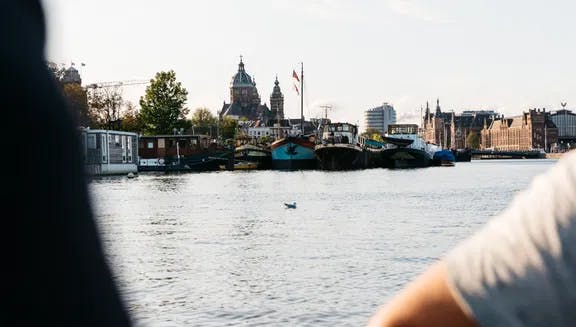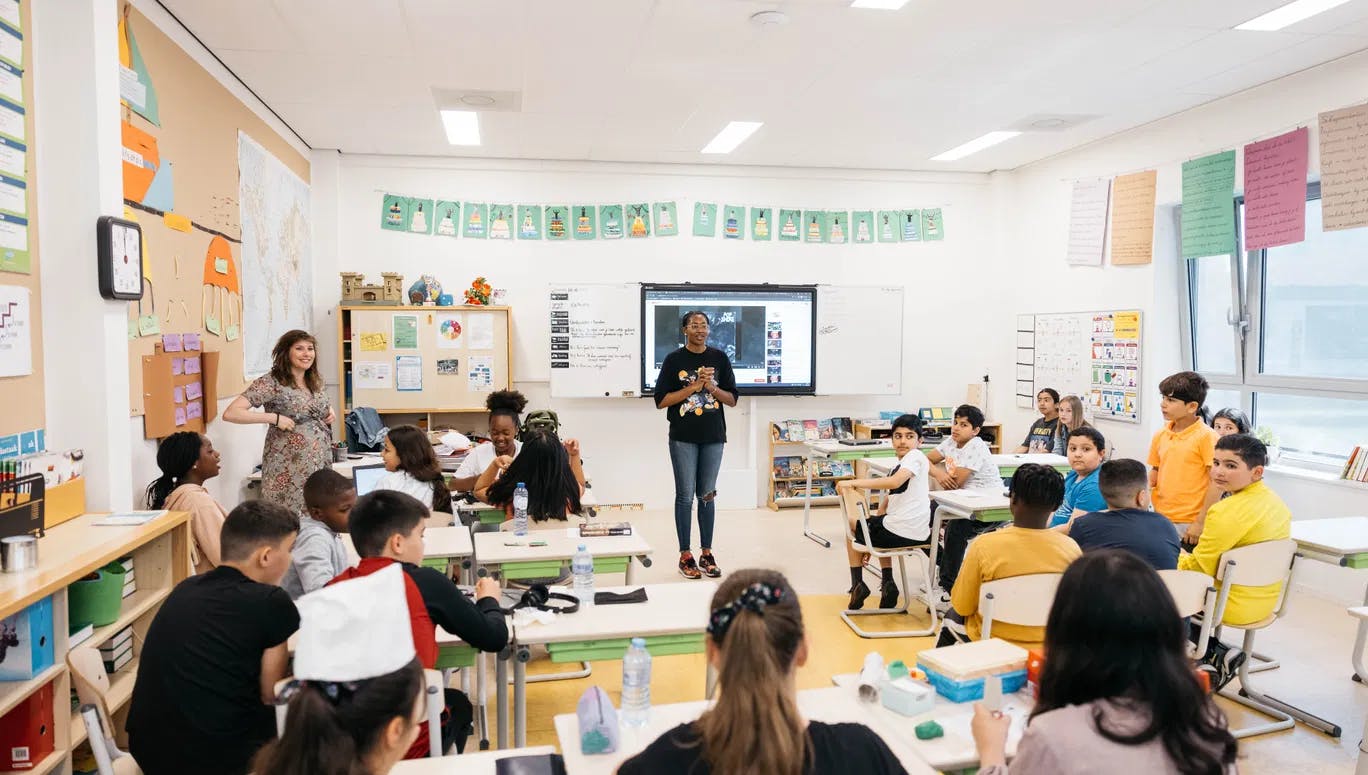
Amsterdam to host the Social Enterprise World Forum 2023
25 January 2023

Amsterdam Impact believes that putting impact entrepreneurship on the curriculum of educational institutions at all levels will contribute to a new generation with the skills to make a difference. We have co-created and co-financed several initiatives, starting at the very beginning – with primary-school children. In 2021, we worked with Fawaka Entrepreneurship School and the Amsterdam University of Applied Sciences (AUAS) to deliver a six-lesson series on social and sustainable entrepreneurship to 500 children aged nine to 12. The partners are now in discussion with national and international education providers about creating a similar project on a much grander scale.
Amsterdam Impact has also co-funded 1,260 places in Futureproof, a nationwide education programme for students aged 16 to 27. Participants gain entrepreneurial skills and get work experience within impact businesses. Students can join Futureproof via their educational institutions, on location in many Dutch cities, and online via an e-learning platform for impact entrepreneurship. In addition, Amsterdam Impact also funded several practice-oriented training programmes in 2021 that help young professionals kickstart an impact-driven career.
Amsterdam Impact programme manager Ellen Oetelmans believes such initiatives are essential to the transition to a new economy, where impact is the norm. “Education, research, valorisation – it’s important this transition takes place across the board,” she says.
Read more about educating the ‘impact-makers of the future'.
Such educational initiatives are part of a broader drive to accelerate the transition to a new economy. Amsterdam Impact works to gather and share learnings that catalyse the growth of social enterprises, and that embolden mainstream businesses to improve their social and environmental impact. Building Better Business, for example, helps companies transition from mainly profit-driven organisations into pioneers of creating change through business. “We want to stimulate knowledge sharing, show great examples of companies already doing the work, and encourage participants to take steps, even if small. Every organisation can make a change within its own sphere of influence,” says Oetelmans.
To strengthen the Dutch impact entrepreneurship ecosystem, 80 organisations – including the City of Amsterdam – have joined the City Deal Impact Entrepreneurship. This partnership, launched in 2021, brings together different levels of government with entrepreneurs and other partners to achieve systemic change and remove the barriers faced by impact entrepreneurs. Ecosystem thinking also guided initiatives to support early-stage and growing impact enterprises, who were particularly vulnerable due to the uncertainty caused by the Covid-19 pandemic.
The RE:SILIENCE programme was launched to help impact enterprises emerge from the crisis stronger than before. Amsterdam Impact also teamed up with Social Enterprise NL and Impact Hub Amsterdam for a series of free online masterclasses. Almost 400 impact entrepreneurs have signed up for the classes since they were launched in December 2020.
Read the full article on how to target transition to build an impact city.
Alongside a good business plan and a healthy dose of idealism, impact entrepreneurs need to be able to sell their products and services to thrive. So improving market access is one of the six pillars of Amsterdam Impact’s 2019-2022 programme. In addition to embracing socially responsible procurement that considers the triple bottom line – people, planet and profit – the City of Amsterdam is also facilitating deal-making for enterprises that provide inclusive and sustainable products and services. The Buy Social network’s ‘pitch-and-match’ events have so far led to more than 50 deals between social enterprises and buyers from other companies and organisations.
Amsterdam Impact has also been fostering opportunities to get social enterprises on the radar of individual customers. “Although Amsterdam’s historical centre is home to many exciting social enterprises,” explains Oetelmans, “we wanted to encourage residents and visitors to explore the entire city. So we designed seven conscious shopping routes – one for each city district.” In 2018, the idea of The Impact Days was born; an annual national campaign to put social entrepreneurs in the spotlight. Covid-19 restrictions meant The Impact Days campaign 2020 was an almost fully digital event. The interactive ‘next-level city’ created as part of the campaign featured more than 180 enterprises across the Netherlands. The 2021 campaign maintained this digital platform alongside in-person events and activities. And this year’s edition will see even more focus on understand and responding to the needs of social enterprises, with the aim not only of changing the consumer’s perspective, but also helping social enterprises market themselves better and increase their sales. Find out more about Amsterdam Impact’s work to unlock markets.
Finding the right finance can be a real headache for impact entrepreneurs. Even if an early-stage business does secure investment, that same investor may not continue backing the business as it grows. Amsterdam Impact is working to address the funding challenge in a number of ways, for instance with its partnership with Co-Financing our Future (CoFoF). Launched in 2019, CoFoF has quickly become the leading peer-to-peer impact investing community in the Netherlands, offering input from key players in the Dutch investment landscape.
The CoFoF community complements the Integrated Capital Network (ICN), launched in 2019, which gives impact entrepreneurs at different stages of growth a chance to pitch their business to various finance providers – from private investors to banks, foundations and venture capital firms. ICN members meet for ‘lab’ events to match up pitching enterprises and investors. Note that a match is not always made immediately: Makers Unite – where newcomers to the Netherlands produce sustainable textile products for corporate clients – pitched in the ICN’s pilot lab back in 2018, initially without success. The company used the advice it received to refine its proposition and came back in 2020 with a second pitch, which led to substantial investment. This example illustrates one of the network’s key selling points: examining an impact enterprise at each stage of its growth and figuring out the right mix of advice, introductions, and, ultimately, funding.
Read the full article on facilitating funding for an impact city.
“Small impact enterprises are a crucial part of a community’s fabric,” says Oetelmans. “Their societal impact is really tangible and direct.” But small impact enterprises often need funding and expertise to make a real difference. And that’s where competitions and initiatives co-created by Amsterdam Impact can help.
Among these was the 2018 contest ‘Localise the SDGs’, which aimed to support entrepreneurs implementing one or more of the Sustainable Development Goals in Amsterdam. One project selected was Tha Block Bizkids by Fawaka Ondernemersschool, which contributed to SDG 10 (reduced inequality) and SDG 12 (responsible consumption and production) by teaching sustainable entrepreneurship to children in Amsterdam neighbourhoods affected by socio-economic deprivation. One young participant pitched the idea of putting ‘eyes’ on bins, because “people are more likely to throw their garbage in the bin if they feel watched.”
In 2021, Amsterdam Impact worked with the City of Amsterdam to launch Boost je Buurt (‘Boost your Neighbourhood’), a challenge for impact-driven entrepreneurs striving to make Amsterdam’s neighbourhoods healthier, more inclusive and more sustainable. Twenty-eight entrepreneurs were selected to join a programme to help them set up or accelerate their neighbourhood-focused impact enterprises. Participants ranged from Bijlmer Bookstore, Amsterdam’s first Afrocentric bookshop, to Women Skate the World, which uses skateboarding to empower girls, women and LGBTQI+ people. “Everyone made valuable connections – with other entrepreneurs, people in their neighbourhoods or civil servants,” says Oetelmans. “And we will continue to support local impact entrepreneurs. We are already working on the 2022 edition.” The programme creators are looking into extending it beyond Amsterdam next year and nurturing a far-reaching ‘neighbourhood’ of small, but mighty, impact entrepreneurs.
Find out more about how Amsterdam Impact nurtures neighbourhoods.
This article is based on a collaboration with Pioneers Post, the independent news network for the global impact community in which author Catalina Iorga created the Cities of Impact series of articles focusing on the work of Amsterdam Impact, the City of Amsterdam’s impact entrepreneurship programme.